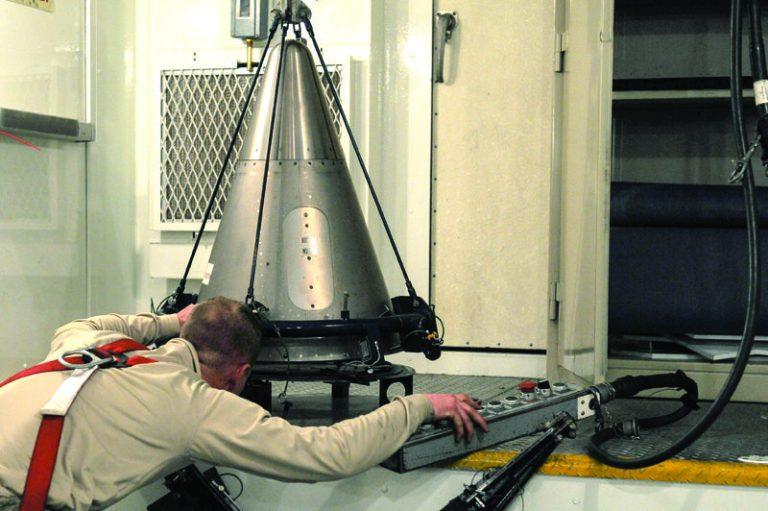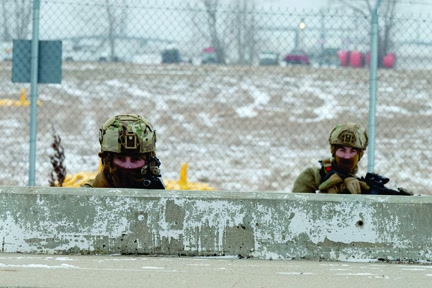Air Force Global Strike Command’s sweeping study of cancer cases in the intercontinental ballistic missile community will expand this summer to include environmental samples from the launch facilities themselves, one of several next steps officials detailed during a virtual town hall June 5.
The study, which began in February 2023, has already looked at hundreds of air and swipe samples from launch control centers—the underground bunkers where missileers work in 24-48 hour shifts—and launch control support buildings. Of those hundreds of samples, four were found to have elevated amounts of a possible carcinogen at two launch control centers at Malmstrom Air Force Base, Mont., and a Launch Control Equipment Building at Minot Air Force Base, N.D.
Now, military bioenvironmental experts are preparing to go into the silos that house the ICBMs.
“We’re targeting this between July and September,” said Brig. Gen. Dave Miller, director of logistics and engineering at Global Strike Command. “We’re working again with the program office and [the U.S. Air Force School of Aerospace Medicine], and the Surgeon General’s office to build a sample of locations out in the missile fields. As of the current plan right now, we’re going to look at two launch facilities in each of the squadrons at each of the wings, assess that data to take a look at, are we targeting all the right areas, before we go out to the rest of the locations to sample.”
The goal is to start collecting samples in July and continue through September, officials said during the town hall, which was open to Active-Duty Airmen and members of the public.
The focus of the sampling will likely be on polychlorinated biphenyls (PCBs), the chemical that was found in the control facilities and are “probable human carcinogens” according to the EPA. Officials said they also study samples for “fertilizers, pesticides, volatile organic compounds,” and more.
It’s not just missileers who have concerns. A Military.com report published last week shared the fears of maintainers who enter the missile silos to conduct repairs. Security forces, food service workers, and others are also worried.
While they wait for the lab results from the launch facility samples, AFGSC says it will release the findings from its third round of environmental testing in the control facilities at the three active ICBM bases later this summer.
“Our sampling plan across the three rounds was, we’re there looking for seasonal variations in use of industrial, occupational, environmental, and local chemicals or potential contaminants that might be in the environment. And some of those do fluctuate with us depending on the season,” Col. Tory W. Woodard, commander of the USAF School of Aerospace Medicine, said.
In the few facilities where PCBs were detected above EPA limits, Global Strike officials said they took immediate steps to conduct cleanups. Beyond that, however, Miller said the command is taking steps to deep clean its facilities, standardizing the process across all locations. A finalized contract for that cleaning is coming soon, he added.
In addition to the environmental sampling, the study is also comparing cancer rates among missileers and other ICBM-related jobs to those among the rest of the military and the general population. Preliminary data released in March showed elevated rates of prostate and breast cancer.
However, that data only covered Department of Defense electronic medical records from 2001-2021, capturing those who were diagnosed with cancer through the Military Health System (MHS), including through the Tricare health insurance program. The Air Force anticipates the initial data makes up fewer than 25 percent of the total cancer cases that make be captured during the study.
A second release of data, planned for September and dubbed “Phase 1B” of the epidemiological part of the study, will include more records, including:
Those diagnosed with cancer through the Veterans Affairs health system back to 1991
Those diagnosed through the military system and put in the DOD’s cancer registry back to 1986
Those diagnosed through the VA and put in the DOD cancer registry back to 1976
Another batch, “Phase 1C,” will follow in the fall and include death records from the National Cancer Institute.
“Our future will include Phase 2, which is where we get a virtual pooled registry where we pull cancer statistics from a pool of data from 45 different states,” Woodard said. “What we are learning from that and that will be a little bit delayed, probably into 2025, is that it takes us months and months and months to get that data from those multiple states.”
Elsewhere in the town hall, the first opened to members of the public, many former service members who worked with ICBMs were eager to know how the study would capture their experiences, especially given that many installations and facilities are now closed or decommissioned.
“If you had one of the AFSCs that placed you in the missile community from 1976 going forward, those AFSCs are all involved,” Woodard said of the epidemiological study. “It’s not just those that worked at our current bases, but it’s anybody who worked at our previous bases.”
Hundreds of participants logged on for the town hall, reflecting the intense interest in the study. For years, the Air Force dismissed concerns among the missile community about connections between their work and cancer. In early 2023, those concerns were raised again as a result of possible increased cases of non-Hodgkin Lymphoma, a blood cancer, at Malmstrom Air Force Base.
AFGSC commander Gen. Thomas A. Bussiere has pledged to take an expansive approach with the study and reiterated to town hall participants that he does not intend to sweep the issue under the rug.
“I will tell you that it’s personal to all my commanders in the field, it’s personal to my deputy commander sitting to my right, and it’s personal to me,” Bussiere said. “Because we all have experience over our lifetimes, in our careers with dealing with the various different levels and aspects of cancer both inside the department and outside the department.
“From a personal perspective, Capt. Bussiere dealt with cancer in a different career field in our Air Force. … I also had many friends and colleagues back in the ’90s that had experienced different forms of cancers. And I believe it’s our obligation to completely understand the environment we asked our Airmen to operate in and do what we can to mitigate any risk or exposure.”














